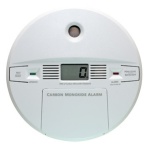Carbon monoxide is the #1 cause of accidental poisoning
New PA law requires landlords to install carbon monoxide alarms in all units
You would not move into a house or apartment that did not have a smoke detector – but what about a carbon monoxide detector? Unlike smoke, carbon monoxide is odorless, colorless, and often goes undetected until it is too late.
A new law in Pennsylvania, the Carbon Monoxide Alarm Standards Act, requires landlords to have carbon monoxide alarms installed in all of their units by June, 2015. Pennsylvania is reportedly among the states with the most accidental carbon monoxide poisonings in the country. Whether law requires it or not, it is best practice for all homeowners and renters to have carbon monoxide detectors installed. They are generally inexpensive and it is the only means of detecting an otherwise undetectable substance that could cause serious harm or death.  What is carbon monoxide poisoning? How does carbon monoxide poisoning occur? Carbon monoxide leaks when a device isn’t burning all of its fuel. The gas enters the blood stream and prevents the blood from absorbing necessary oxygen. Gas stoves, fires, heating boilers, gas-powered water heaters, paraffin heaters, and solid fuel-powered water heaters are all potential sources of carbon monoxide. The problem arises when such appliances are poorly maintained, not serviced and housed in poorly ventilated areas. Space heaters are one of the most popular ways to stay warm when the winter weather sets in. But, if a heater is not properly ventilated, if it is used improperly or malfunctions, it can cause deadly carbon monoxide poisoning.
What is carbon monoxide poisoning? How does carbon monoxide poisoning occur? Carbon monoxide leaks when a device isn’t burning all of its fuel. The gas enters the blood stream and prevents the blood from absorbing necessary oxygen. Gas stoves, fires, heating boilers, gas-powered water heaters, paraffin heaters, and solid fuel-powered water heaters are all potential sources of carbon monoxide. The problem arises when such appliances are poorly maintained, not serviced and housed in poorly ventilated areas. Space heaters are one of the most popular ways to stay warm when the winter weather sets in. But, if a heater is not properly ventilated, if it is used improperly or malfunctions, it can cause deadly carbon monoxide poisoning.
Leaving your car running in the garage is another way that carbon monoxide can seep into your home. In the winter it can be tempting to let the car warm up for a few minutes before leaving the house, but if you do so inside an attached garage, even with the garage door open, the poisonous gas can leak into the house.
Earlier this week, two people were killed and twelve were poisoned by carbon monoxide in a recording studio in Passaic, New Jersey. Witnesses describe that two musicians hit the floor while they were playing – “they just dropped.”
Michael Shafrin, the city’s fire prevention official, said the deaths could have been prevented by a carbon monoxide detector. Commercial buildings in NJ were not required to have them, but the Passaic City Council is looking to introduce new legislation that would require carbon monoxide detectors in all multi-use buildings.
A few days later, a man, woman, and four-year-old boy were killed by carbon monoxide poisoning caused by a heater in Pensacola, Florida.
The best way to prevent these kinds of tragedies is to install a carbon monoxide detector, and to always use heating devices safely. But, early detection of poisoning symptoms can help prevent fatalities. Symptoms of carbon monoxide poisoning include nausea, vomiting, dizziness, and headaches. The symptoms are often mistaken for common illness, but if multiple people in the same building are experiencing the same symptoms, that may be a sign.
These cases of poisoning can be the result of a product defect, or of negligence on the part of the property owner. If you or a loved one have suffered from carbon monoxide poisoning on someone else’s property or in a public building, you may be entitled to compensation for your medical treatment and pain and suffering. To learn more about your legal options, contact the carbon monoxide poisoning lawyers at Munley Law Personal Injury Attorneys at 855-866-5529.
Posted in Premises Liability.
Tagged Negligence Pain and Suffering










